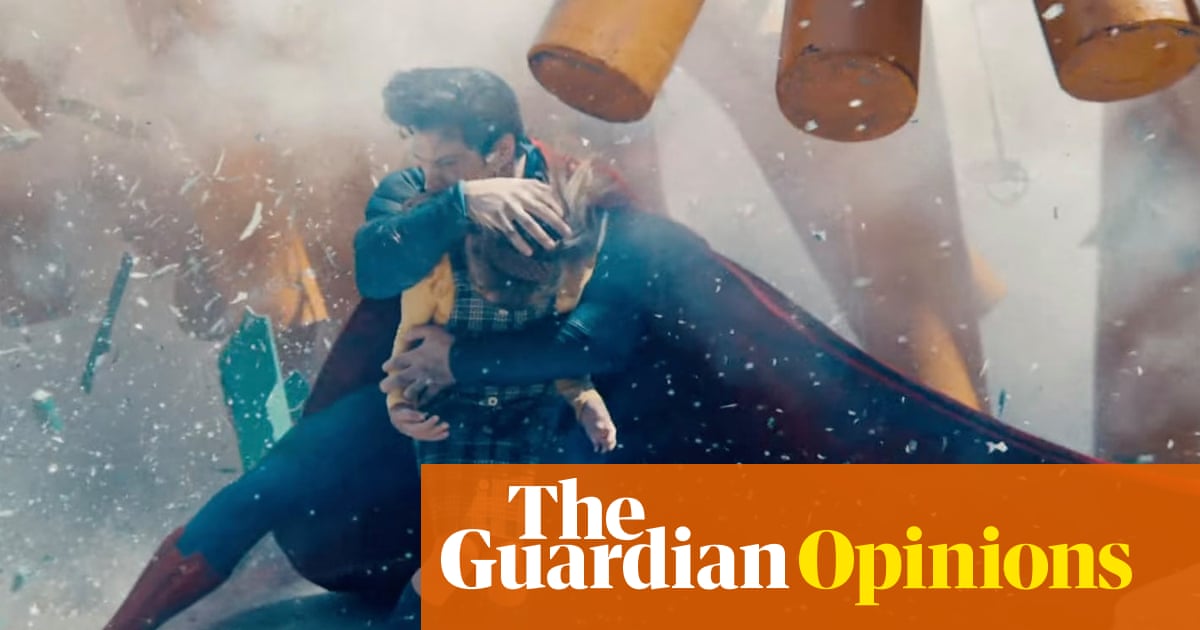In the 1960s, Marvel comics made its name by dragging superheroes down to street level. Peter Parker worried about his homework. The Fantastic Four bickered like flatmates. Even the Hulk, a walking nuclear tantrum, was really just a green and muscular guy having a bad day. Over at DC, though, the heroes remained clean, polished and largely unbothered – moral titans gazing down from above, solving problems without ever really having any of their own.
Superman was the prototype of that ideal: an all-powerful alien whose only weakness was a glowing space rock and an unshakable sense of duty. He wasn’t like us – he wasbetterthan us. And that was the point. When Margot Kidder’s Lois Lane first meets the man of steel in 1978’sSuperman, she is almost impossibly awestruck by the presence of this walking, talking, flying god. Lois’s wide-eyed vulnerability is a stark contrast with the condescension she doles out to his alter ego, Clark Kent. The two sides of the Last Son of Krypton might be exactly the same person, but it’s virtually impossible for anyone to recognise them as such, because one radiates impossible power while the other can barely hold on to his briefcase.
For those of us brought up on the 1978 version of Superman, the sight of him squirming in the face of a mildly probing interview by Lois Lane (Rachel Brosnahan) inthe first full trailer for James Gunn’s Supermanis like watching a Greek god forget his lines in a school play. Rather than a morally upright, granite-jawed colossus watching over us like Jesus in a cape, this new David Corenswet-essayed take on Kal-El is one who is less a saviour from the stars than a disbelieving schoolboy who can’t quite understand how he’s getting aggravation for rescuing a cat up a tree.
Zack Snyder briefly gave us a glimpse of a Superman who is not always the world’s favourite superhero in Man of Steel in 2013, but by the time we got to 2016’s execrable Batman v Superman: Dawn of Justice, all those intriguing undertones about divine power and human frailty had dissipated. The fact that Gunn is picking this concept up and running with it tells us that he clearly wants to bring us a Superman who inspires awe once again; though there will be no return to Christopher Reeve’s effortlessly noble, flawlessly statuesque Man of Steel. This time around, it’s less about the idea of Superman as an extra-terrestrial trying to work out how to be human, and more about Kal-El as a guy who is just as human as the rest of us – but just happens to come from outer space.
Might the bad guys of Gunn’s film – Nicholas Hoult’s Lex Luthor and Angela Spica’s Engineer – help Superman find his place in the moral architecture, by showing him why rules matter?In the comics, the Engineer is a member of the Authority – an antihero crew parachuted into DC from the WildStorm imprint in the late 1990s. This morally ambiguous squad of powerhouses believe the world is too broken for compassion, and too far gone for the sense of truth, justice and the American way espoused by the Man of Steel. Where Superman sees hope, they see a target. Where he wants to protect, they want to improve – violently, if necessary. It’s not yet clear if other members of The Authority – trenchcoated brute Midnighter or the unhinged, solar-powered demigod that is Apollo – will appear in Gunn’s Superman. But the arrival on screen of these most morally unhinged saviours might be just what our boy needs to see the light. Could such ethical tension – a fundamental clash between idealism and pragmatism – be the emotional backbone not just of this film, but of Gunn’s new DCU at large?
Either way, it’s clear that DC’s big cheese is less interested in the Superman who flies above us and more the one who stumbles among us. This new Man of Steel is primed and ready to save the world … even if he’s starting to suspect that being human might just be the hardest part of the whole gig.
